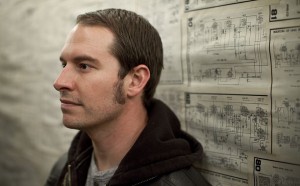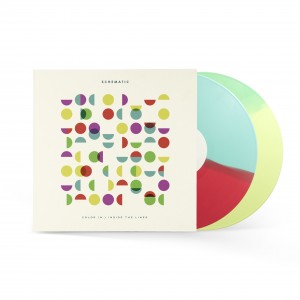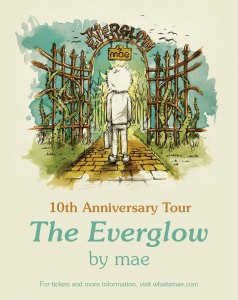 Dave Elkins, the man behind Schematic and lead singer of the reunited Mae, joined Earn This by phone to chat about everything he’s got going on. He offered such detailed insight that we decided to split up the conversation into two parts. Part One covers lots of Mae news and stories, plus some of the historical motivation for Schematic. Part Two delves into the status, plans, and vision of Schematic. A few excerpts are transcribed below to whet your appetite in case you don’t have your headphones handy.
Dave Elkins, the man behind Schematic and lead singer of the reunited Mae, joined Earn This by phone to chat about everything he’s got going on. He offered such detailed insight that we decided to split up the conversation into two parts. Part One covers lots of Mae news and stories, plus some of the historical motivation for Schematic. Part Two delves into the status, plans, and vision of Schematic. A few excerpts are transcribed below to whet your appetite in case you don’t have your headphones handy.
Audio
Part One
Download link (you may have to right click and “Save As”)
Part Two
Download link (you may have to right click and “Save As”)
 Excerpts
Excerpts
On Mae, and Reasons for the Everglow Tour
“As we were sound checking our way through our farewell tour, we were jamming on songs that weren’t part of our set but were part of the Mae catalog, and then sometimes we would jam on something brand new. Rob would come up with a piano line or something and play it during sound check, and I’d jump in and play it on guitar. There’s still such a clear chemistry amongst the five of us.”
“[T]he Everglow, at least by commercial standards, is Mae’s most successful record, and I know it means a lot to different people, and I wanted to use that as the fuse to put it all back together and ignite it up.”
I’ve spent the last three and a half years looking at new ladders to climb.
“The relationships amongst the five of us are becoming stronger than maybe they’ve ever been because there’s perspective. When you don’t have to put all your eggs in the Mae basket, you don’t grip it so tightly or hate it so much when it didn’t work out the way that you needed it to. And you don’t love it so hard that you exhaust the romance of that relationship.”
“We just sort of blindly went into it. And thank God we did, because if we had thought about it a little harder, we probably wouldn’t have made some of the decisions that we made that, in some cases, were some of the best we ever had… We would leave home in January, not come home until June. Just playing shows six or seven nights out of every week for five and a half months. I wouldn’t do that for a million dollars right now. Just say, ‘Okay, look, you gotta play three hundred shows a year for two years, and at the end of it there’s a million bucks waiting for you.’ I’d be like, ‘I gotta find another way to make some money. That doesn’t sound like a good idea to me.'”
On Schematic, and the Dots It Connects
“We’re all entrepreneurs that are trying to figure out how to use our talents and our creativity to make a living. We want to keep it as art, but at the same time we want to see commercially where it could go. We hate calling it a product but at the same time that’s what it is. And how can we learn how to protect our art? How can we learn how to protect our brands? How can we learn how to turn our fifteen minutes of fame or our playing in front of fiteen people in a room into playing in front of fifteen hundred people in a room? How can we turn getting paid fifteen dollars an hour to fifteen hundred dollars a show? Basically, how can we turn this into a career that has sustainability? How can we figure out, in its slower months, how to live off the richer months so that way we don’t have to neglect our passion and our past for the sake of bill pay.”
“You see these bands now that pop up where, ‘Oh yeah, our drummer’s pretty good, but he’s also amazing at video editing, and that’s why we have a video blog. And we’re pretty funny guys, we’re interesting characters, and if you go to our website we have tens of thousands of people who subscribe to our weekly blog.’ Or, ‘Our guitar player has also got a little studio and he’s really great at engineering, he’s got great sound, so we record everything ourselves.’ Those types of things didn’t exist twenty years ago, and now you probably have more bands that record themselves than you have bands that don’t.”
Putting garage band simply on a Mac laptop is going to make more musicians. It might not make more great musicians, but maybe over the years, it actually would.
“When you’re the lead singer of Mae, when you’re a producer, when you’ve got a studio, when you are a songwriter, when you’re trying to put together some crazy idea like Schematic, when you’re a husband, when you’re a son, when you’re all these different things all at once, you can really—and I can, and I do—I end up having big ideas and spreading myself so thin amongst them that sometimes the balls don’t roll fast enough, and then that’s discouraging. And what I need to do, and what I’m in the process of doing, is finding people who are better than me at everything from organizational management skills to web design, that have more or a different perspective in the music industry than I do, and starting from scratch. So that way only what is best for Schematic is what rises to the top. And sometimes that will come directly from me, and sometimes that will come from everybody but me, and I’m okay with that. But when you’re starting it by yourself you have to wear all the hats at once, and that’s just been a really difficult juggling act. And you know, I don’t know anything about web design, so if I’m trying to create a social networking community website that focuses on education for creative artists, then I need to find a really good web designer. and they’re not free.”
I think if you want to say, “What will Schematic look like five years from now?”, then it’s about, “What will the creative industry, the creative arts industry, the music industry—what will that look like five years from now?”
“You can write a jingle that sells a bar of soap, or you can write a conceptual record where each song is forty-five minutes in length and most of them are instrumental and avant-garde. I think both of those are, by definition, forms of music. If they’ve got melody, and if they’ve got scansion, if they’ve got rhythm perhaps, and in some cases they don’t, that’s still gonna be classified as music. And some of it is give-away, some of it is for sale, experiences both free and with charge. All these different ways that we create content, it keeps us moving forward. It’s about how a fan is made, how a fan is kept, and how a fan is engaged. And it’s about what the fan does when asked, or when prompted, or even just when excited about what an artist does. How do we turn that into a successful campaign, a successful career?”
“You can write a song and you can put it out online a day after the master’s done. But if you wanna be a doctor, you can’t just roll up to the hospital and say, ‘Hey, I’m ready to perform my first surgery.’ You gotta spend a decade of education figuring out how to view that. And then, once you’ve done that, you start planning years in front of you so you can learn what you still don’t know about medicine. And so i feel like, with the artist, there has to be this sort of impulsivity we feed off of sometimes. We want to be not held down by the real world, and I think that’s a little ridiculous. I think that there is still gonna be time, freedom of creativity, but have it with purpose and with structure. And understand what tools are available to you. Understand who your fan base is, understand what they appreciate out of you, and do it better. and do it more often.”
 Info
Info
Musical snippets used were from Mae’s “We’re So Far Away” and “Prologue” off The Everglow, and Schematic’s “Outside” and “Stand” off Color (n.) inside the Lines.
The Everglow Tour: Tickets | VIP Packages




